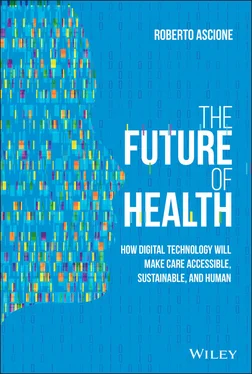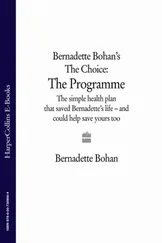For general information on our other products and services or for technical support, please contact our Customer Care Department within the United States at (800) 762-2974, outside the United States at (317) 572-3993 or fax (317) 572-4002.
Wiley also publishes its books in a variety of electronic formats. Some content that appears in print may not be available in electronic formats. For more information about Wiley products, visit our web site at www.wiley.com.
Library of Congress Cataloging-in-Publication Data
Names: Ascione, Roberto, author.
Title: The future of health: how digital technology will make care accessible, sustainable, and human / Roberto Ascione.
Other titles: Futuro della salute. English
Description: Hoboken, New Jersey : Wiley, [2022] | Translation of Il futuro della salute / Roberto Ascione. Milano : Ulrico Hoepli editore, 2018. | Includes bibliographical references and index.
Identifiers: LCCN 2021034635 (print) | LCCN 2021034636 (ebook) | ISBN 9781119797258 (cloth) | ISBN 9781119797326 (Adobe PDF) | ISBN 9781119797319 (ePub)
Subjects: MESH: Medical Informatics | Digital Technology | Delivery of Health Care—trends | Biomedical Technology—trends | United States | Europe
Classification: LCC R855.3 (print) | LCC R855.3 (ebook) | NLM W 26.5 | DDC 610.285—dc23
LC record available at https://lccn.loc.gov/2021034635
LC ebook record available at https://lccn.loc.gov/2021034636
Cover image: © Alfredo De Simone, Creative Director at Healthware Group
Cover design: Wiley
To my father, doctor for the people and maestro for life
I have been involved in medicine and digital technologies for over 25 years.
I trained as a doctor but never became one because I was also passionate about computer science and torn between these two elements: programming and medicine. I realized that everything in health care was largely analog, and still is in many ways. I started writing my own software using MIT's Logo programming language in middle school, and ever since I had been fascinated by the idea that, using computer science, you could write software to manage practically any problem. It was an intuition that time has confirmed!
I started to realize that health care and computer science had something in common: code! Both DNA and software programming languages were code, so I had the idea to combine these two passions of mine and to deal with digital technology and medicine. I realized very early on that there was no existing role for this, and I didn't know of a single company considering this dual discipline. Everyone advised me against entering this nonexistent field, but by the time I was almost a doctor, I decided to follow my instincts and founded a company called Healthware, so named because it was at the intersection of health care and software. The initial idea was very simple: to create software for medicine by providing better treatment tools for doctors, which resulted in better treatment for patients.
What was my motivation?
If I had been a doctor, even a very good one, I would have had a limited impact on a few thousand people. By producing software for the health-care world, the impact could be much greater. Healthware was born of this idea. It started to grow quite rapidly during the first years—and we are still here talking about it 25 years later.
Healthware was founded in southern Italy and is now present in various parts of the world. However, we are not here to talk about Healthware, but rather about what we help to cultivate: the development of digital health to improve lives.
Let's start with a few concepts that may certainly seem obvious, but are not as simple as they appear.
Digital technology is ubiquitous, and many aspects of our individual lives are already largely linked to digital platforms for service, communication, or social sharing. These dimensions of daily life are now totally linked to these systems and technologies, which has effects on an entire series of processes: economic, productive, psychological, behavioral, and much more. This phenomenon has also occurred in the health sector, where it has obviously changed a lot of things over the past few years. We have become accustomed to enjoying certain platform services that have profoundly transformed various sectors, from the hotel industry to the music industry. We have also become both producers and consumers at the same time. Let's think about music: not only is it no longer bought and sold as it was before, but because of the way it is consumed, it is no longer produced in the same way. Musicians don't create albums with two hits and a B-side anymore. (Remember long-playing albums with 10-songs?). Now consumers buy one song at a time, so artists must produce 10 good songs if they want ten hits. As these patterns permeate various industries, they change them dramatically. All this combined is not just a marginal change, but a radical transformation of health that has an even greater scope than that of music or travel.
I feel this change, and the challenge it underlies, deep down. When these radical transformations come, a moment of change occurs, with a before and an after. In the aftermath, you can find yourself on the side of companies, even very important ones, that had access to these innovations at the right time, but did not follow them, such companies were overwhelmed. The alternative is to be on the side of companies that grasped these transformations, perhaps starting from scratch, and today find themselves playing a role that simply didn't exist before. I believe that health care has entered this zone of radical transformation and what we are witnessing is incomparable to anything we have known in the last 40 to 50 years.
I'll make a few preliminary considerations to frame the world in which we are moving, and consequently correlate them to the digital development taking place in the health sector. Precisely to anticipate needs and trends, it is increasingly common for analysts to study the so-called megatrends (i.e., forecasts of the medium- to long-term trends that will emerge).
Viewing the forecasts for the next 15 years (i.e., the megatrends related to 2030), we discover some things that will have a very strong impact. Meanwhile, demographers estimate that the world's population will reach 8.6 billion people by 2030, compared to 7.86 billion in 2021. That is a monstrous figure that will have economic, industrial, nutritional, and political impacts. First of all, think of the life expectancy increase and consequent health problems linked to an aging population, and the subsequent need to organize the related caregiving mechanisms. And managing the health of 8.6 billion people will cost significantly more than what's required for 7.8 billion people; an increase that will make the current form and level of care unsustainable. All of this will turn into a giant acceleration element of transformation.
Parallel to global population growth, as of today, 5 billion people have internet access—an increase of 1 billion over 2017. In addition, the new mobile broadband, 5G, will increasingly bring omnipresent connectivity even to territories lacking infrastructure, facilitating, for example, access to schooling for children in remote regions of Africa and Asia.
Of course, this phenomenon will also increasingly enable access to telemedicine and even robotic telesurgery. (The first practical demonstrations of 5G applications in this area date back to 2019, when a Chinese neurosurgeon was able to operate on a patient suffering from Parkinson's disease 3,000 kilometers away.)
The result of this health transformation, thanks to technology, is an increasingly better prepared and better cared-for population. More connectivity means an ever-increasing knowledge of health digitization, and consequently, an increasing demand for certain services. In a word, it will ensure greater and, subsequently, universal access to care. It is a real revolution, and as such, unstoppable, because everything is moving on an exponential scale and time frame, especially if we pause to reflect on concepts such as the speed and cost of technology availability, diffusion, and habits of digital culture.
Читать дальше












